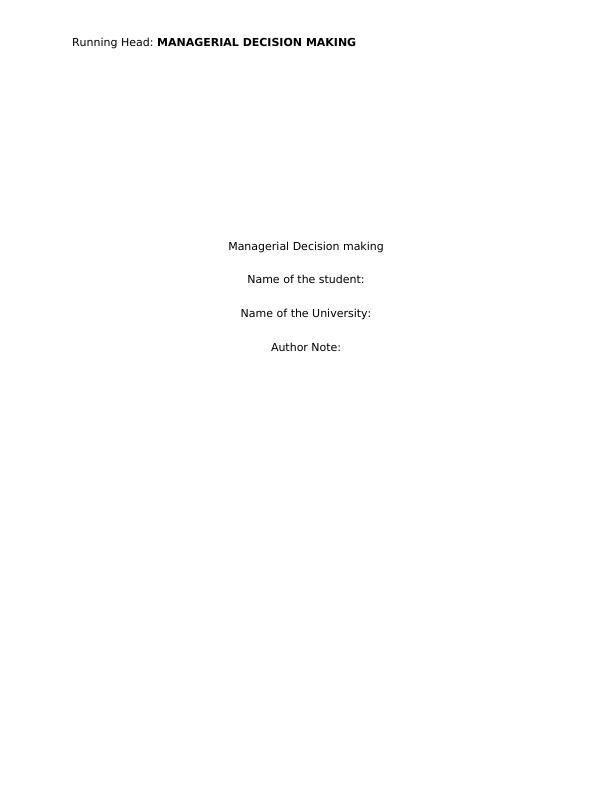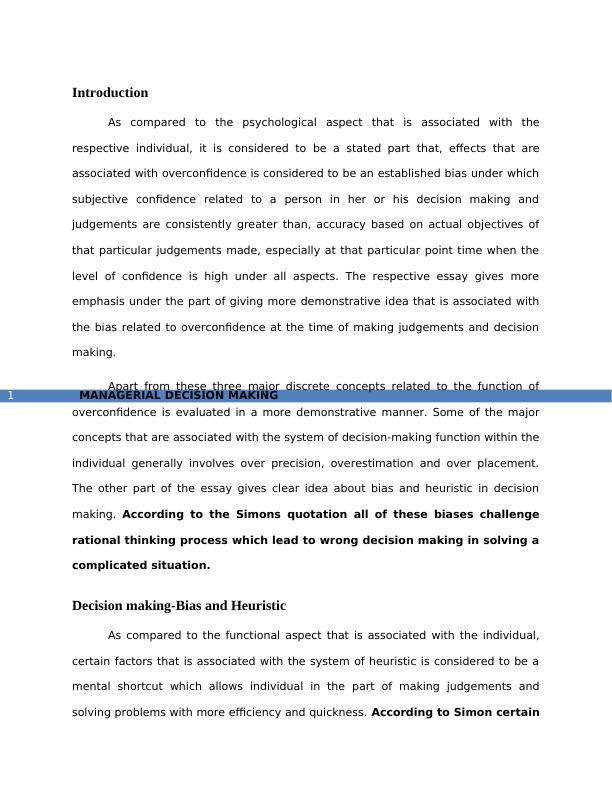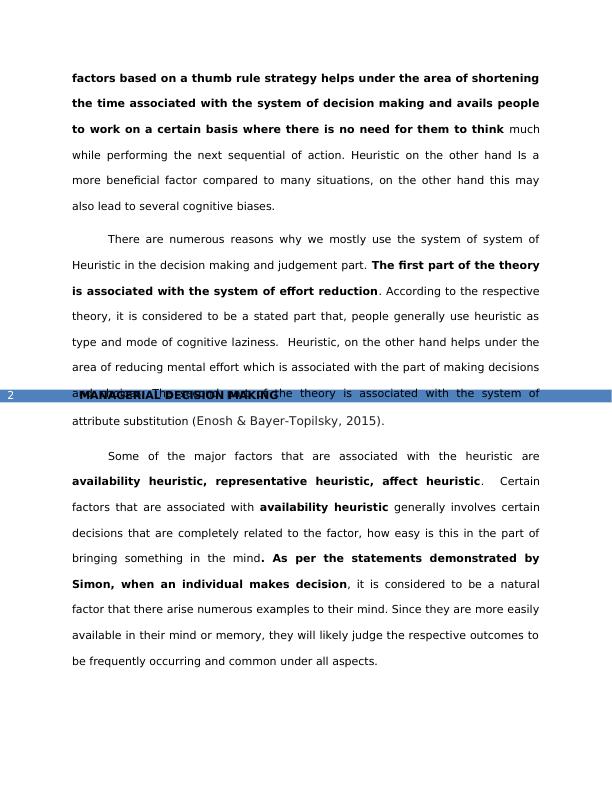Psychological Aspect And Decision Making
Added on 2022-08-18
10 Pages2107 Words14 Views
Running Head: MANAGERIAL DECISION MAKING
Managerial Decision making
Name of the student:
Name of the University:
Author Note:
Managerial Decision making
Name of the student:
Name of the University:
Author Note:

MANAGERIAL DECISION MAKING1
Introduction
As compared to the psychological aspect that is associated with the
respective individual, it is considered to be a stated part that, effects that are
associated with overconfidence is considered to be an established bias under which
subjective confidence related to a person in her or his decision making and
judgements are consistently greater than, accuracy based on actual objectives of
that particular judgements made, especially at that particular point time when the
level of confidence is high under all aspects. The respective essay gives more
emphasis under the part of giving more demonstrative idea that is associated with
the bias related to overconfidence at the time of making judgements and decision
making.
Apart from these three major discrete concepts related to the function of
overconfidence is evaluated in a more demonstrative manner. Some of the major
concepts that are associated with the system of decision-making function within the
individual generally involves over precision, overestimation and over placement.
The other part of the essay gives clear idea about bias and heuristic in decision
making. According to the Simons quotation all of these biases challenge
rational thinking process which lead to wrong decision making in solving a
complicated situation.
Decision making-Bias and Heuristic
As compared to the functional aspect that is associated with the individual,
certain factors that is associated with the system of heuristic is considered to be a
mental shortcut which allows individual in the part of making judgements and
solving problems with more efficiency and quickness. According to Simon certain
Introduction
As compared to the psychological aspect that is associated with the
respective individual, it is considered to be a stated part that, effects that are
associated with overconfidence is considered to be an established bias under which
subjective confidence related to a person in her or his decision making and
judgements are consistently greater than, accuracy based on actual objectives of
that particular judgements made, especially at that particular point time when the
level of confidence is high under all aspects. The respective essay gives more
emphasis under the part of giving more demonstrative idea that is associated with
the bias related to overconfidence at the time of making judgements and decision
making.
Apart from these three major discrete concepts related to the function of
overconfidence is evaluated in a more demonstrative manner. Some of the major
concepts that are associated with the system of decision-making function within the
individual generally involves over precision, overestimation and over placement.
The other part of the essay gives clear idea about bias and heuristic in decision
making. According to the Simons quotation all of these biases challenge
rational thinking process which lead to wrong decision making in solving a
complicated situation.
Decision making-Bias and Heuristic
As compared to the functional aspect that is associated with the individual,
certain factors that is associated with the system of heuristic is considered to be a
mental shortcut which allows individual in the part of making judgements and
solving problems with more efficiency and quickness. According to Simon certain

MANAGERIAL DECISION MAKING2
factors based on a thumb rule strategy helps under the area of shortening
the time associated with the system of decision making and avails people
to work on a certain basis where there is no need for them to think much
while performing the next sequential of action. Heuristic on the other hand Is a
more beneficial factor compared to many situations, on the other hand this may
also lead to several cognitive biases.
There are numerous reasons why we mostly use the system of system of
Heuristic in the decision making and judgement part. The first part of the theory
is associated with the system of effort reduction. According to the respective
theory, it is considered to be a stated part that, people generally use heuristic as
type and mode of cognitive laziness. Heuristic, on the other hand helps under the
area of reducing mental effort which is associated with the part of making decisions
and choices. The second part of the theory is associated with the system of
attribute substitution (Enosh & Bayer-Topilsky, 2015).
Some of the major factors that are associated with the heuristic are
availability heuristic, representative heuristic, affect heuristic. Certain
factors that are associated with availability heuristic generally involves certain
decisions that are completely related to the factor, how easy is this in the part of
bringing something in the mind. As per the statements demonstrated by
Simon, when an individual makes decision, it is considered to be a natural
factor that there arise numerous examples to their mind. Since they are more easily
available in their mind or memory, they will likely judge the respective outcomes to
be frequently occurring and common under all aspects.
factors based on a thumb rule strategy helps under the area of shortening
the time associated with the system of decision making and avails people
to work on a certain basis where there is no need for them to think much
while performing the next sequential of action. Heuristic on the other hand Is a
more beneficial factor compared to many situations, on the other hand this may
also lead to several cognitive biases.
There are numerous reasons why we mostly use the system of system of
Heuristic in the decision making and judgement part. The first part of the theory
is associated with the system of effort reduction. According to the respective
theory, it is considered to be a stated part that, people generally use heuristic as
type and mode of cognitive laziness. Heuristic, on the other hand helps under the
area of reducing mental effort which is associated with the part of making decisions
and choices. The second part of the theory is associated with the system of
attribute substitution (Enosh & Bayer-Topilsky, 2015).
Some of the major factors that are associated with the heuristic are
availability heuristic, representative heuristic, affect heuristic. Certain
factors that are associated with availability heuristic generally involves certain
decisions that are completely related to the factor, how easy is this in the part of
bringing something in the mind. As per the statements demonstrated by
Simon, when an individual makes decision, it is considered to be a natural
factor that there arise numerous examples to their mind. Since they are more easily
available in their mind or memory, they will likely judge the respective outcomes to
be frequently occurring and common under all aspects.

End of preview
Want to access all the pages? Upload your documents or become a member.
Related Documents
9 Examples of Managerial Decisionslg...
|9
|2260
|13
Managerial Decision Makinglg...
|12
|3720
|466
Assignment Concepts of Decision Makinglg...
|8
|2037
|49
Different Types of Biases Affecting Growth of Leaders in Businesslg...
|7
|1796
|85
Managerial decision-makinglg...
|10
|2190
|317
Different Types of Biasness and Their Nature in Decision Makinglg...
|14
|4236
|315